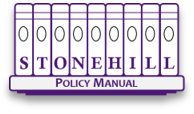Effective Date: June 20, 2023
Last Reviewed: June 20, 2023
The ultimate collection and deposit of cash and checks is the responsibility of the Controller’s Office, although the actual receipt often takes place in individual departments. Because cash is negotiable and easily transported, it is important that proper controls exist in both the Controller’s Office and at the departmental level to safeguard this asset. It is a priority of the Controller’s Office to reduce the use of cash as much as possible by replacing the transaction with an electronic alternative.
When cash still must be used, departments must have clear guidelines that incorporate the following controls.
Safeguarding
- Restrictively endorse checks immediately upon receipt stating, “For Deposit Only – Stonehill College”. A stamp can be used, or endorsements can be handwritten.
- Keep cash/checks in a locked and secure area until they can be deposited. Access to the area should be restricted to only designated employees. If an employee with custody responsibilities leaves their position, any keys should be collected, or combinations changed.
- Departments regularly collecting more than $500 should request a safe from the Controller’s Office.
There are circumstances where large amounts of cash are collected in a single unique event that cannot be immediately delivered to the College Cashier due to timing. If this involves a department that does not have a safe then the funds should be collected, counted and locked in an overnight bag and delivered to the Campus Police safe for safeguarding. The overnight bags can be obtained from the Controller’s Office or Campus Police before the event. As soon as the following workday begins, the funds should then be transported from Campus Police to the College Cashier.
- Make timely deposits. The sooner cash/checks can be deposited, the less exposure to theft or loss of funds. Ideally deposits should be made within 24 hours. If amounts are insignificant (less than $100), then deposits can be made weekly.
Recording Cash Receipts
- All cash receipts should be recorded immediately by use of a data entry into a computing system, pre-numbered receipt book, or handwritten log. Receipts can be in manual or electronic format and should contain the amount received, the name of the payer, purpose of the payment, and its form (cash/ check/credit card).
- Provide a receipt. Ideally receipts should be pre-numbered and two-part. One copy should be provided to the payer while the other copy is kept on file. Total deposits can be verified independently by another employee by accounting for each sequentially numbered receipt.
- Cash receipts should not be used for petty cash disbursements, check cashing, making change, or for any personal reasons.
Reconciliation
- Verify the deposit by agreeing amounts to Banner on at least a monthly basis.
Segregation of Duties
- No one employee should be allowed to collect, handle or transport and deposit checks/currency without some additional control feature to ensure that all funds are accounted for.
